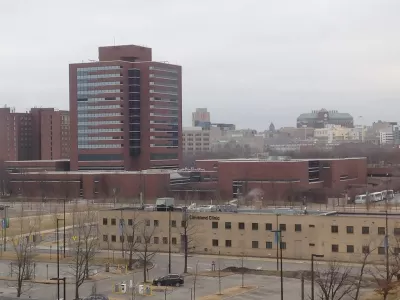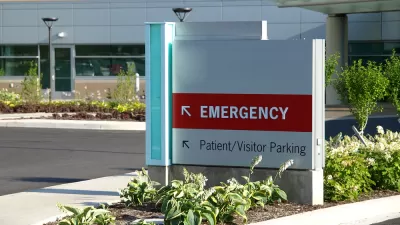Inequities in healthcare are linked to inequities in urban planning, a public health researcher argues.

[Updated January 18, 2019] For Green Inequalities, the blog of the Barcelona Laboratory for Urban Environmental Justice and Sustainability, public health researchers Helen Cole and Emily Franzosa explore how access to hospitals and medical care fit into cities' ongoing move toward gentrification. "In much the same way that urban gentrification continues to see the exclusion of poorer residents from once-disinvested and now newly desirable neighborhoods, so are these residents increasingly excluded from accessing healthcare and the health care jobs in these neighborhoods that have long been a steady source of employment," according to the article.
One problem is that large medical companies—sources of both medical services and local employment—are shuttering full-service hospitals in favor of expensive practices serving higher-income clientele in gentrifying areas. "These shifts in the provision and cost of basic healthcare reflect the same patterns as those in the cost of living in gentrifying neighborhoods: when goods and services are increasingly provided for the new, wealthy class, they often leave behind less affluent residents," according to the article.
For a case study, Cole and Franzosa turn to Dallas, Texas, where extreme income inequality and high rates of uninsurance collide. She also points to the successful campaign by Chicago activists to open a trauma center in the South Side—the area's first in 30 years.
[Updated to include both researchers credited for the project.]
FULL STORY: The Gentrification of American Healthcare

Alabama: Trump Terminates Settlements for Black Communities Harmed By Raw Sewage
Trump deemed the landmark civil rights agreement “illegal DEI and environmental justice policy.”

Study: Maui’s Plan to Convert Vacation Rentals to Long-Term Housing Could Cause Nearly $1 Billion Economic Loss
The plan would reduce visitor accommodation by 25% resulting in 1,900 jobs lost.

Planetizen Federal Action Tracker
A weekly monitor of how Trump’s orders and actions are impacting planners and planning in America.

Wind Energy on the Rise Despite Federal Policy Reversal
The Trump administration is revoking federal support for renewable energy, but demand for new projects continues unabated.

Passengers Flock to Caltrain After Electrification
The new electric trains are running faster and more reliably, leading to strong ridership growth on the Bay Area rail system.

Texas Churches Rally Behind ‘Yes in God’s Back Yard’ Legislation
Religious leaders want the state to reduce zoning regulations to streamline leasing church-owned land to housing developers.
Urban Design for Planners 1: Software Tools
This six-course series explores essential urban design concepts using open source software and equips planners with the tools they need to participate fully in the urban design process.
Planning for Universal Design
Learn the tools for implementing Universal Design in planning regulations.
Caltrans
Smith Gee Studio
Institute for Housing and Urban Development Studies (IHS)
City of Grandview
Harvard GSD Executive Education
Toledo-Lucas County Plan Commissions
Salt Lake City
NYU Wagner Graduate School of Public Service



























